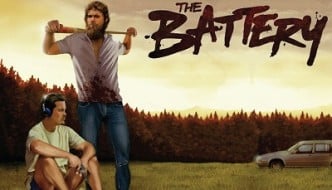Review: Boyhood
July 31, 2014
Director & Writer: Richard Linklater
Starring: Ellar Coltrane, Patricia Arquette, Ethan Hawke
(2014)
“I can’t believe how big they are.”
“Yeah, time’s going by.”
Although this dialogue comes towards the beginning of the Boyhood, from the perspective of its father and grandmother characters, it stings slightly to think about it in regards to the ending. What first just seems to be idle chat between two characters also sums up the accumulative impact the film shows itself to have, as it continues. The almost three-hour running length seems to go by in a far shorter time as we watch siblings Mason (Ellar Coltrane) and Samantha (Lorelei Linklater) growing up over the course of twelve years.
Although Boyhood documents the progression of both siblings, it primarily centres on the life of Mason. It is here that director Richard Linklater succeeds in making you feel very much like a close relative of Mason, marvelling at how quickly both him and Samantha grow from young children to young adults, and by the time the film has ended we have become resistant to move on. For anyone who has seen Linklater’s Before trilogy, this episodic approach to film making will be easily understandable. However, Boyhood takes this notion of the episodic form and accumulative effect and furthers it into a singular epic focusing on childhood. It is incredibly touching, and relatable in the way it parallels to how we view our own childhood through a lens of nostalgia.
Time is an essential factor here and is charted throughout the film in numerous ways. Linklater adopted a unique way of capturing the story of childhood to adolescence, to eventually becoming a young adult by filming for a handful of days every year over a twelve year period. We first meet Mason when he is a curious and innocent six year-old: still something of a blank canvas in regards to who he will eventually grow up to be. This initially allows the film to be quite open in its approach, delving into the personalities and stories of other characters, including Patricia Arquette as the devoted single mother and the recently returned yet charming father in the form of Ethan Hawke. As the film develops, the focus on Mason tightens, but other characters are still given appropriate moments which highlight the progression of their lives – Arquette’s character in particular is given this room to breathe, and as a result perhaps becomes the most devastating. The mother serves as a realistic portrait of the repeated misfortunes which can easily befall many people’s lives, and Arquette portrays this whilst maintaining a strength and humour in the role throughout.
An enthralling mixture of nostalgia and appreciation for the present moment permeates the film, particularly from the perspective of the generation born at a similar time to its central characters. Throughout its duration, Boyhood is aware of the cultural context of each year. The acute attention to detail is exemplified in scenes which feature the children watching 90’s TV shows like Dragonball Z, or keeping up with the development of the Harry Potter series. As a result, a unique sense of immediacy is created. Linklater said he wanted the film to feel like memories of moments Mason is remembering from a point in the future. It certainly succeeds in giving that impression, whilst also expressing the distinctive features of each year and the emotions highlighted in the principal characters.
This atmosphere carries perfectly to other sections of the film. Every song on the soundtrack feels like it has been sourced directly from each moment of Mason’s life. How these moments may be remembered from a nostalgic point of view are perfectly in alignment with the cultural references Linklater drops throughout the film. In one scene when, through the speakers of the car, we hear “Do You Realize??” by The Flaming Lips, we are reminded of all the songs which have served as a soundtrack to seemingly unimportant and forgettable moments of our own lives. It reflects how we, the audience, have our own soundtracks to particular childhood moments within our lives, which may seem insignificant at the time but still render a place in our memories. It is almost impossible to not think about your own childhood memories after, or even during Boyhood.
The continuity in the film results in it feeling completely immersive in how it slowly charters the progression of Mason. Yes, we deal with Mason, Samantha and the parents throughout, but at the same time, we don’t. The characters we meet at the beginning aren’t quite the same characters by the time Boyhood has finished; as you’d expect, over a twelve year period, a six year old is going to change in not only age but in personality and interests. However, Linklater knew from the beginning that his movie was going to be continuously changing. This allows for the dialogue and moments in the film to feel extremely naturalistic. As it was shaped gradually, this meant that the four main actors were also inevitable contributors to the film, contributing to its life-like edge. A scene where Mason is seen with nail varnish came about when Coltrane arrived on set with it. Linklater proves himself able to transfer these real life occurrences into integral but unexaggerated scenes. Similarly, a rant about the impact of Facebook on our lives was drawn into the film from a real life occurrence on Coltrane’s part. This sensitivity towards the balance between real life and film-making allows a ‘mirroring’ of reality to take place, which Linklater weaves seamlessly into the fiction of the film. It results in Boyhood feeling so natural that it is truly difficult to not form an emotional attachment to the story, the characters and their growth.
Whether you watch it through the eyes of a teenager, young adult, parent or none of these altogether, it seems Boyhood has the potential to not just be a film about childhood, but also parenting and ‘living in the moment’ within our own lives. Yes, a number of things that happen to Mason over the course of the film may feel insignificant at first; a lot of ordinary things take place, and large sections may feel like nothing of any real importance is going on. However, to take issue with this is perhaps to miss the point. It is the ‘relatable’ quality of the film, achieved through the importance it places on the people and characters opposed to a pre-ordained, fleshed out story or script, which allows the film to maintain an understated power of emotional depth. As Linklater has previously dealt with in his films, the story truly comes from the specific moments, year by year, which eventually come to create the whole. It is this that allows Boyhood to have an extraordinary, naturalistic impact wherein we can even see the emotions and outcomes of our own world reflected back to us on screen.
Eleanor Roche
Boyhood is showing at Hyde Park Picture House until August 4th and at cinemas around the country.
Filed under: Film, TV & Tech
Tagged with: film reviews



Comments